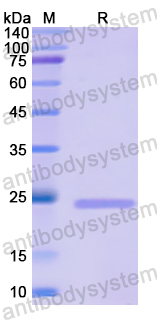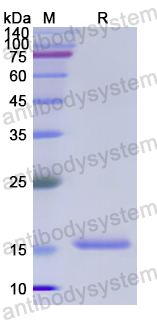Catalog No.
YHE04301
Expression system
E. coli
Species
Homo sapiens (Human)
Protein length
Val331-Ile537
Predicted molecular weight
24.78 kDa
Nature
Recombinant
Endotoxin level
Please contact with the lab for this information.
Purity
>90% as determined by SDS-PAGE.
Accession
P33992
Applications
ELISA, Immunogen, SDS-PAGE, WB, Bioactivity testing in progress
Form
Lyophilized
Storage buffer
Lyophilized from a solution in PBS pH 7.4, 0.02% NLS, 1mM EDTA, 4% Trehalose, 1% Mannitol.
Reconstitution
Reconstitute in sterile water for a stock solution. A copy of datasheet will be provided with the products, please refer to it for details.
Shipping
In general, proteins are provided as lyophilized powder/frozen liquid. They are shipped out with dry ice/blue ice unless customers require otherwise.
Stability and Storage
Use a manual defrost freezer and avoid repeated freeze thaw cycles. Store at 2 to 8°C for frequent use. Store at -20 to -80°C for twelve months from the date of receipt.
Alternative Names
CDC46, DNA replication licensing factor MCM5, CDC46 homolog, P1-CDC46, MCM5
FADD Functions as an Oncogene in Chr11q13.3-Amplified Head and Neck Squamous Cell Carcinoma., PMID:40370064
Whole transcriptome profiling of cardiac injury: insights from a neonatal mouse sepsis model., PMID:40111648
Identification of RUVBL2 as a novel biomarker to predict the prognosis and drug sensitivity in multiple myeloma based on ferroptosis genes., PMID:39985176
TFAP4 Regulation of MCM5 Activates the PI3K/AKT Pathway to Promote Invasion and Metastasis of Gastric Cancer., PMID:39971831
Mcm5 mutation leads to silencing of Stat1-bcl2 which accelerating apoptosis of immature T lymphocytes with DNA damage., PMID:39929806
Unidirectional MCM translocation away from ORC drives origin licensing., PMID:39824870
Functional Analysis and Experimental Validation of the Prognostic and Immune Effects of the Oncogenic Protein CDC45 in Breast Cancer., PMID:39811603
MCM2-7 ring closure involves the Mcm5 C-terminus and triggers Mcm4 ATP hydrolysis., PMID:39747125
Chromatin licensing and DNA replication factor 1 as a potential prognostic and diagnostic biomarker for gastric cancer., PMID:39730687
The conserved wobble uridine tRNA thiolase Ctu1 is required for angiogenesis and embryonic development., PMID:39705244
Proteomic Analysis of Vibrio parahaemolyticus-Stimulated Pinctada martensii Proteins for Antimicrobial Activity, Potential Mechanisms, and Key Components., PMID:39596793
Recurrent hepatocellular carcinoma is associated with the enrichment of MYC targets gene sets, elevated high confidence deleterious mutations and alternative splicing of DDB2 and BRCA1 transcripts., PMID:39486583
Investigating the Mechanisms of Anti-tumoral Effect of Combination Therapy of Calcitriol and Sodium Pentaborate Pentahydrate on HepG2 Hepatocellular Carcinoma Cells., PMID:39441231
Sod1-deficient cells are impaired in formation of the modified nucleosides mcm5s2U and yW in tRNA., PMID:39322276
MCM proteins are up-regulated in placentas of women with reduced insulin sensitivity., PMID:39268985
The shared mechanism and potential diagnostic markers for premature ovarian failure and dry eye disease., PMID:39003404
MCM5 is a Novel Therapeutic Target for Glioblastoma., PMID:38765057
MEG3 shuttled by exosomes released from human bone marrow mesenchymal stem cells promotes TP53 stability to regulate MCM5 transcription in keloid fibroblasts., PMID:38686583
Identification of genes related to ribosomal proteins in colorectal cancer: exploring their potential as biomarkers, prognostic indicators, and therapeutic targets., PMID:38664314
Reproductive endocrine disruption effect and mechanism in male zebrafish after life cycle exposure to environmental relevant triclosan., PMID:38492288
Bioinformatics identification of characteristic genes of cervical cancer via an artificial neural network., PMID:38453655
RNA-seq reveals role of cell-cycle regulating genes in the pathogenicity of a field very virulent infectious bursal disease virus., PMID:38362295
Minichromosome maintenance protein 5 - a promising prognostic marker of oral epithelial dysplasias and oral squamous cell carcinomas., PMID:38304521
CYP1B1 promotes colorectal cancer liver metastasis by enhancing the growth of metastatic cancer cells via a fatty acids-dependent manner., PMID:38196537
PSMA7 promotes the malignant proliferation of esophageal cancer., PMID:38173490
Pathogenic Genes for Congenital Microtia: A Bioinformatics Analysis., PMID:37643078
RNA Sequencing and Bioinformatics Analysis Reveals the Downregulation of DNA Replication Genes by Morindone in Colorectal Cancer Cells., PMID:37642925
Systematic analysis of expression and prognostic significance for MCM family in head and neck squamous cell carcinoma., PMID:37526267
Minichromosome maintenance proteins in lung adenocarcinoma: Clinical significance and therapeutic targets., PMID:37517032
COVID-19 of differing severity: from bulk to single-cell expression data analysis., PMID:37486005
In Silico Characterization of RNASEH2A Pathogenic Variants and Identification of Novel Splice Site Donor Variant c.549+1G>T in Indian Population., PMID:37456470
MCM5 is an oncogene of colon adenocarcinoma and promotes progression through cell cycle control., PMID:37385108
m6 A-Dependent Modulation via IGF2BP3/MCM5/Notch Axis Promotes Partial EMT and LUAD Metastasis., PMID:37171793
Knockdown of ASF1B inhibits cell proliferation, migration, invasion and cisplatin resistance in gastric cancer through the Myc pathway., PMID:37153049
Mutational analysis of minichromosome maintenance complex component (MCM) family genes in Chinese Han women with polycystic ovarian syndrome., PMID:37132453
Identification of key molecular players and associated pathways in cervical squamous cell carcinoma progression through network analysis., PMID:37119038
The novel peptide PFAP1 promotes primordial follicle activation by binding to MCM5., PMID:37086099
Phase separation of DDX21 promotes colorectal cancer metastasis via MCM5-dependent EMT pathway., PMID:37029300
Exogenous hydrogen sulfide (H2S) exerts therapeutic potential in triple-negative breast cancer by affecting cell cycle and DNA replication pathway., PMID:37002576
O-GlcNAcylation of YTHDF2 promotes HBV-related hepatocellular carcinoma progression in an N6-methyladenosine-dependent manner., PMID:36765030
MTA2 is one of 14 Transcription factors predicting recurrence free survival in gastric cancer and promotes cancer progression by targeting MCM5., PMID:36741260
Identification of novel candidate genes and predicted miRNAs in atopic dermatitis patients by bioinformatic methods., PMID:36543921
Enhanced MCM5 Level Predicts Bad Prognosis in Acute Myeloid Leukemia., PMID:36479666
Atypical E3 ligase ZFP91 promotes small-molecule-induced E2F2 transcription factor degradation for cancer therapy., PMID:36375317
Transcription profiling of feline mammary carcinomas and derived cell lines reveals biomarkers and drug targets associated with metabolic and cell cycle pathways., PMID:36220861
Label-free electrochemical immunosensor for picomolar detection of the cervical cancer biomarker MCM5., PMID:36038236
Selective role of the DNA helicase Mcm5 in BMP retrograde signaling during Drosophila neuronal differentiation., PMID:35737938
Integrated transcriptome and in vitro analysis revealed anti-proliferative effect of sodium perborate on hepatocellular carcinoma cells., PMID:35716648
Bioinformatic Analysis of the Expression and Clinical Significance of the DNA Replication Regulator MCM Complex in Bladder Cancer., PMID:35698656
Unveiling Molecular Mechanisms of Nitric Oxide-Induced Low-Temperature Tolerance in Cucumber by Transcriptome Profiling., PMID:35628425


